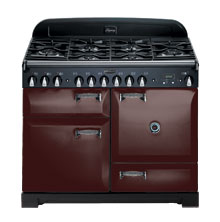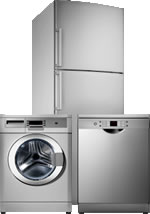
|
Kitchen Range - The important details to consider when choosing a range are broken into two main topics, stovetop features and oven features. After all, a range really is two different appliances built into one cabinet. Our recommendations for choosing a stovetop are the same whether the stove is part of a range or an entirely separate appliance; likewise an oven.
While there are a few specific details to consider for a range, we'll refer you to our reviews of stovetops and ovens to learn about features and considerations for finding the right appliance for you. After reading those sections, apply what you learn for each to a range, along with the details we cover below.
Gas, Electric or Dual Fuel?
You may already have a preference for gas or electric, and that is fine, go with what you like. However, if you aren't sure or would like to know about the pros and cons of each type of heat source, we can shed some light on the topic.
Professional and avid cooks typically choose a gas stovetop because it gives them greater control over the temperature. The flame is infinitely variable from low to high, and provides steady, continuous heat. On the other hand, electric stovetops cycle on and off. Instead of staying on continuously, the electric element heats up, turns off, then heats up again trying to approximate the temperature set on the control. This kind of heating is not ideal because it can scorch foods and makes it difficult to provide the precise temperatures required by things like delicate sauces, candies or even simply simmering food.
On the other hand, an oven heats the air inside and then the air circulates and cooks the food. An electric element cycles on and off, just like with the stove, but unlike a pot on the stove, the oven air temperature is fairly stable. For this reason, an electric oven is equally acceptable as a gas oven.
Opinions vary, some people say gas ovens warm up more quickly, have moister heat and are less likely to cause oven hot spots. Others say electric ovens maintain more accurate temperatures and their cleaning feature works better. It is unclear whether any of these statements are true of gas versus electric or if they might be influenced by the brand and quality of the appliance. Another consideration is that a gas oven may be able to operate during a power outage, but an electric oven cannot. This assumes that the gas oven doesn't rely on electrical ignitors or sensors to operate.
The cost of operation is a function of what you pay, and what you expect to pay in the future, for gas versus electricity. For some, there may be a clear cost advantage of one energy source over the other.
In our opinion, a gas stovetop is the preferred choice for its stable continuous heat. For an oven, gas or electric are about equally matched. Because many manufacturers offer dual fuel ranges, you can choose to cook with one type of heat on the stove and the other heat source in the oven. If you do choose a dual fuel range, your space in the kitchen will have to be both wired for 240V and plumbed with a gas line, although we recommend doing so anyway, for the sake of flexibility in the future.





